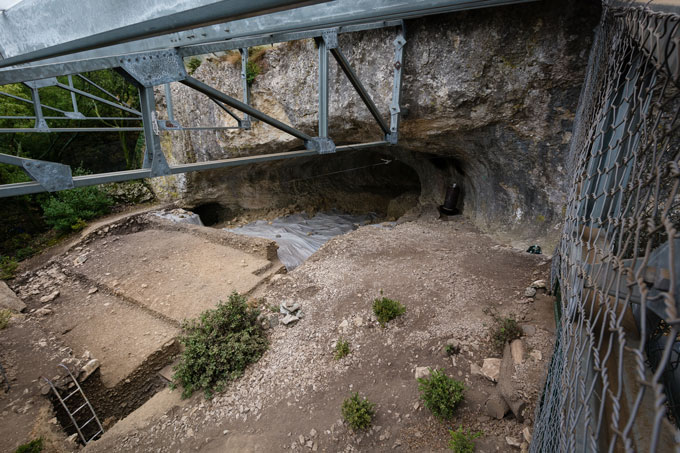Extreme Climate Survey
Scientific news is collecting questions from readers about how to navigate our planet’s changing climate.
What do you want to know about extreme heat and how it can lead to extreme weather events?
The possibility of an isolated long-term Neanderthal population in southwestern Europe supports the idea that these hominids “most likely had their own complex evolutionary history, with local extinctions and migrations, just like us,” says paleogeneticist Carles Lalueza-Fox of the Institute of of Evolutionary Biology in Barcelona, who did not participate in the new study.
A team led by archaeologist Ludovic Slimak of Université Toulouse III – Paul Sabatier in France and population geneticist Martin Sikora of the University of Copenhagen named the French Neanderthal discovery Thorin, after a character in JRR Tolkien’s book. The Hobbit. Thorin’s remains, discovered at the entrance to the Grotte Mandrin rock shelter in 2015, are still being excavated.
Several dating methods applied to teeth from Thorin and animals buried near his body, as well as Thorin’s position in the Grotte Mandrin sediment, indicate that this Neanderthal lived between 50,000 and 42,000 years ago, Slimak and Sikora’s group reports on 11 September in Cell genomics.
Molecular segments representing about 65 percent of Thorin’s genome were recovered from one molar, Sikora says. Thorin’s DNA was then compared to DNA previously extracted from other, ancient Neanderthals H. sapiens and people today.
The arrays of gene variants in Thorin’s DNA more closely match the previously reported DNA structure of Neanderthals who lived about 105,000 years ago, versus Neanderthals dating from about 50,000 to 40,000 years ago. However, analyzes of carbon and other chemical elements related to the diet in Thorin’s bones and teeth suggest that he lived during an ice age that did not develop in Europe until about 50,000 years ago.

H. sapiens and Neanderthals may have alternated occupations of Grotte Mandrin several times between about 56,800 and 40,000 years ago (SN: 2/9/22). Thorin’s DNA shows no signs of having acquired genes through mating either with Neanderthals outside his lineage or with H. sapiens.
Thorin also inherited from his parents an unusually high percentage of DNA segments containing consecutive pairs of identical gene variants. The reduced genetic variation of that type, previously found in Siberian Neanderthals, reflects mating between close relatives in a small population (SN: 19.10.22).
Taken together, the genetic evidence fits a scenario in which Thorin belonged to a Neanderthal lineage that split from other European Neanderthals around 105,000 years ago, the researchers say. For roughly the next 50,000 years, they suspect that Thorin’s ancestry consisted of small networks of close-knit communities that swapped wives.
The reasons why those ancient groups avoided interbreeding with other Neanderthals in the region, perhaps related to linguistic or cultural differences, are unclear, Sikora says.
It’s hard to say whether the population size of Thorin’s lineage stayed constant or shrank over time, perhaps as communities became more isolated, Sikora says. Thorin currently represents the only source of DNA from his lineage.
Similarities in Thorin’s DNA to that of a Neanderthal individual from Gibraltar, on the southern tip of Spain, suggest the newly reported lineage extended to parts of southwestern Europe, the investigators say. There is no consensus on an age for the Gibraltar fossil, a partial braincase found in a quarry in 1848.
“If Thorin is indeed 50,000 years old, this would be an amazing discovery that shows a strong genetic structure in late Neanderthals,” says paleogeneticist Cosimo Posth of the University of Tübingen in Germany. But, he says, further excavation and research at Grotte Mandrin will have to confirm when Thorin lived.
Researchers found Thorin’s remains in a small natural depression in the floor of the rock shelter. Slimak and Sikora’s group still can’t say how the body got there or whether it originated from older sediments. An older date for the partial skeleton would indicate, less surprisingly, that Thorin belonged to an isolated population that quickly disappeared.
The long-term isolation would have resulted in Thorin inheriting a greater number of short DNA segments containing identical gene pairs than reported in the new study, Lalueza-Fox says. Isolating more Thorin DNA or collecting genetic remains from other fossil members of his line will clarify the evolutionary history of these closely related Neanderthals, he says.
#Ancient #DNA #reveals #previously #unknown #lineage #Neanderthals
Image Source : www.sciencenews.org